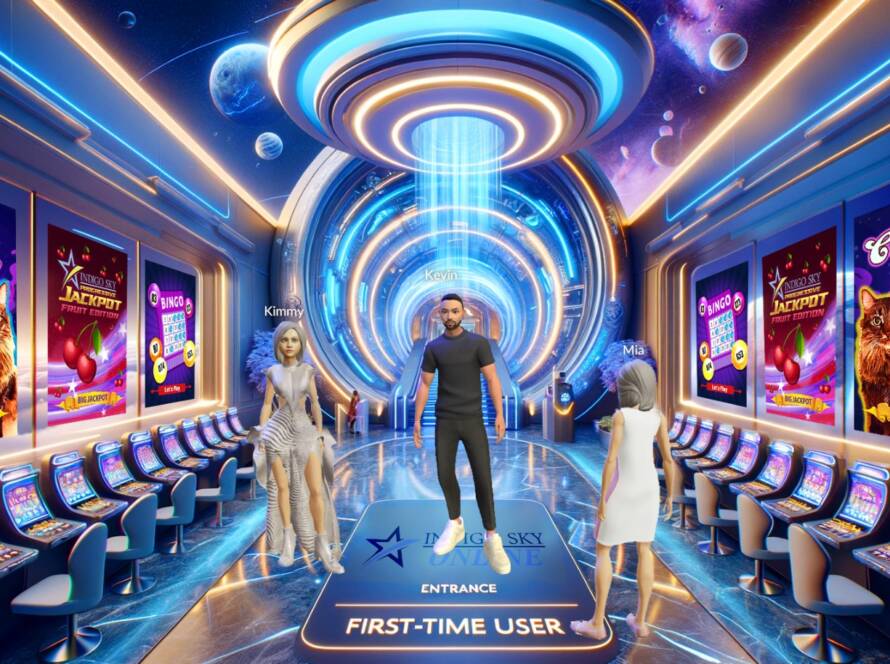A New Era in Game Studios
Picture this: It’s 2028, and slot game studios look very different from what we see today. In a cozy office, a small team of five developers and designers work together, chatting about new game concepts. The hustle and bustle of large development floors are gone, replaced by efficient, tight-knit teams that rely on AI to handle the heavy lifting. With cutting-edge AI-driven tools at their disposal, these studios no longer need dozens of specialized staff to create high-quality slot games. Instead, they focus on creativity and strategy while AI takes care of the complex, repetitive, and time-consuming aspects of game development.
This is not a future of job losses but rather a reimagined approach to how we build, market, and scale slot games. AI doesn’t replace people; it empowers them, allowing smaller studios to innovate and bring unique game experiences to market faster and more efficiently than ever before. Let’s explore this vision of the future and how it might impact the social casino game market.
Imagine This: Small Teams Enhanced by AI
In this future, a small studio team brainstorms a new slot game concept. They gather ideas for themes, mechanics, and design elements. Once they have a rough vision, AI tools take over to streamline the production process:
- Game Concept and Design: An AI-driven assistant generates storylines, symbols, and character designs tailored to the chosen theme, whether it’s an underwater adventure or a trip to ancient Egypt. With vast databases of art styles and market preferences, the AI tool suggests designs that are likely to engage players. Artists use these AI-generated assets as a foundation, adding their unique touches to make the visuals pop. The result? A visually stunning slot game built in a fraction of the time.
- Procedural Game Mechanics: As the artists work, the studio’s developers feed game mechanics and rules into the AI, which rapidly simulates various payline structures, bonus features, and payout frequencies. Instead of spending weeks fine-tuning these aspects manually, the team can use AI to test countless configurations overnight. The AI recommends the most balanced and entertaining setup based on player engagement models and previous market data.
- Automated Testing and Optimization: In this future, slot games undergo rigorous testing, but the team doesn’t need to manually spin reels for hours to uncover bugs or balance issues. AI-powered testing tools automatically play through the game in different scenarios, identifying potential glitches, gameplay imbalances, and performance bottlenecks. What used to take months now takes mere days, freeing up the team to focus on creative enhancements.
- Personalized Gameplay: AI doesn’t just help in development; it also transforms the player experience. Imagine launching a slot game where every player’s journey is unique. An AI engine analyzes player behavior in real-time and adapts the game’s features accordingly. It suggests tailored bonus rounds, personalized promotions, and even different visual themes, all aimed at keeping players engaged and entertained.
- Content Generation for Marketing: Once the game is ready, the studio turns to AI for marketing support. Generative AI creates captivating gameplay videos, social media posts, and even blog articles about the new slot game. It highlights key features, crafting tailored messages that resonate with different player segments. This not only automates the marketing process but also allows the team to reach a wider audience without a large marketing staff.

The Future Market: Impact and Outcomes
So, what does this future mean for the social casino game market? By leveraging AI, small teams can develop and launch high-quality slot games more quickly and cost-effectively. This brings several potential changes to the industry:
Pros
- Increased Creativity: With AI handling repetitive tasks, small teams have more time to focus on creative storytelling, unique game mechanics, and immersive themes. This could lead to a wave of fresh and exciting slot games that keep the market vibrant and players engaged.
- Cost-Efficiency: Smaller teams mean lower overhead costs. This could level the playing field, allowing indie studios and newcomers to compete with industry giants by producing high-quality games without the need for massive budgets.
- Faster Time-to-Market: AI speeds up every phase of game development, from concept to launch. This means studios can respond quickly to market trends, releasing themed slot games for holidays, events, or pop culture moments with minimal delay.
- Personalized Player Experience: AI-driven personalization creates a more engaging player journey, adapting gameplay based on individual preferences. This increases player retention and loyalty, providing studios with a sustainable revenue model.
Cons
- Risk of Homogenization: While AI can suggest market-driven themes and mechanics, there’s a risk of slot games becoming too similar if everyone relies on the same AI-generated trends. Developers will need to ensure their games maintain a unique identity despite AI-driven design inputs.
- Dependence on AI: Over-reliance on AI tools might lead to a lack of human touch in game design. Although AI can simulate engagement, the best games still come from human creativity and intuition. Striking the right balance between automation and artistic input will be key.
- Data Privacy: Personalized gameplay relies on player data. Studios will need to navigate privacy concerns and regulations, ensuring they use AI-driven insights responsibly and transparently.
How AI Assists Social Casino Game Building
In this envisioned future, AI helps small teams build social casino games by automating asset creation, testing, and even in-game live operations. AI tools generate social features, such as leaderboards and multiplayer mechanics, based on player behavior data, creating a more interactive social experience. Furthermore, AI-driven loyalty systems analyze player habits to deliver targeted rewards and promotions, increasing the longevity and profitability of the game.
A Future with Endless Possibilities
This future of game development, where small teams leverage AI to build, personalize, and market slot games, could drastically change the social casino landscape. It democratizes the industry, allowing smaller studios to produce high-quality games, fueling innovation, and keeping player engagement high. However, it also comes with the challenge of ensuring games maintain their unique charm and personality amidst a wave of AI-generated content.
In the end, this imagined future shows that AI isn’t about replacing human developers but augmenting their capabilities. It empowers small studios to dream big, take creative risks, and bring a new era of immersive, personalized slot games to players around the world. The key to success in this AI-driven future will be combining human creativity with intelligent automation to craft games that stand out in an increasingly dynamic market.


